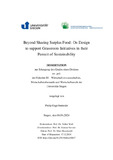Zitierlink:
http://dx.doi.org/10.25819/ubsi/10617Dateien zu dieser Ressource:
| Datei | Beschreibung | Größe | Format | |
|---|---|---|---|---|
| Dissertation_Engelbutzeder_Philip.pdf | 3.5 MB | Adobe PDF |  Öffnen/Anzeigen |
| Dokumentart: | Doctoral Thesis | Titel: | Beyond sharing surplus food: on design to support grassroots initiatives in their pursuit of sustainability | Sonstiger Titel: | Über das Teilen überflüssiger Lebensmittel hinaus: Über Design zur Unterstützung von Graswurzelinitiativen in ihrem Streben nach Nachhaltigkeit | AutorInn(en): | Engelbutzeder, Philip | Institut: | Fakultät III - Wirtschaftswissenschaften, Wirtschaftsinformatik und Wirtschaftsrecht | Schlagwörter: | Community building, Grassroots, Sustainability, Resilience, Food saving, Food resource sharing, Surplus, Abundance, Nachhaltigkeit, Resilienz, Gemeinschaftsaufbau, Basis, Lebensmittel sparen, Gemeinsame Nutzung von Nahrungsmittelressourcen, Überschuss | DDC-Sachgruppe: | 330 Wirtschaft | GHBS-Notation: | QGTX PJX PWS ZZZB |
Erscheinungsjahr: | 2024 | Publikationsjahr: | 2024 | Zusammenfassung: | This dissertation examines the intersection of socio-technical design and grassroots initiatives within the domain of food saving and food sharing, rooted in the context of the Foodsharing community in Siegen, Germany. It explores how socio-technical design can support grassroots efforts in the initiation, daily operations, growth, and broader transition towards sustainable food practices. Through a practice-based and action-oriented research approach, this study delves into the nuances of community values, needs, challenges, and socio-technical practices, revealing the complexities of negotiating surplus food redistribution, community building, and the integration of prosumption practices. Key findings highlight the critical role of socio-technical design in facilitating the sharing of not just food surplus but also resources crucial for food production, thereby fostering a culture of abundance. This shift from food sharing to food resource sharing underscores a transformative ambition towards more sustainable food systems, challenging traditional economic paradigms of consumption, and promoting a holistic approach to community engagement and sustainability. By engaging with the Foodsharing community in Siegen, this dissertation uncovers the intricacies of designing socio-technical systems that accommodate the dynamics of grassroots initiatives. It presents a nuanced understanding of how digital artefacts and platforms, like Foodsharing.de and Telegram, can serve as catalysts for community building and the amplification of sustainable food practices. The study advocates for an approach that accommodates the evolving digital literacy and needs of grassroots communities to support their scaling and growth. This research contributes to the fields of Sustainable Human-Computer Interaction (SHCI), Human-Food Interaction (HFI), and action-oriented research in Human-Computer Interaction (HCI) by providing insights into the interconnectedness of socio-technical design, community building, and sustainable food practices. It emphasizes the need for HCI designs that are sensitive to the complexities of grassroots initiatives, advocating for designs that support the transition from surplus management to the realization of food abundance. In conclusion, this dissertation underlines the potential of socio-technical design in supporting societal change through grassroots initiatives, proposing a shift towards sustainability that is deeply rooted in community engagement, resource sharing practices, and the collective pursuit of abundance. It calls for further research on integrating these insights into the design of socio-technical artefacts, thereby supporting the ongoing evolution of grassroots initiatives towards sustainable food systems. |
DOI: | http://dx.doi.org/10.25819/ubsi/10617 | URN: | urn:nbn:de:hbz:467-28402 | URI: | https://dspace.ub.uni-siegen.de/handle/ubsi/2840 | Lizenz: | http://creativecommons.org/licenses/by-nc/4.0/ |
| Enthalten in den Sammlungen: | Hochschulschriften |
Diese Ressource ist urheberrechtlich geschützt. |
Seitenansichten
50
checked on 27.12.2024
Download(s)
34
checked on 27.12.2024
Google ScholarTM
Prüfe
Prüfe
Diese Ressource wurde unter folgender Copyright-Bestimmung veröffentlicht: Lizenz von Creative Commons


